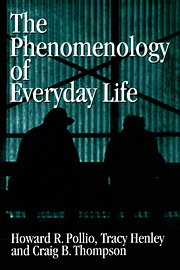PART III - SELECTED TOPICS FROM EVERYDAY LIFE
Published online by Cambridge University Press: 04 August 2010
Summary
The next five chapters explore topics meant to be of interest to the research psychologist and the clinical practitioner. They deal with events and phenomena concerning our interactions with other people, our experiences of a self that falls apart, and our provisional understandings of mortality and death. Although only one of these topics uniquely emphasizes pathological concerns, all are potentially significant for such concerns. For this reason, the topics explored in Part III have been contextualized not only in terms of their locations within philosophy, religion, and psychology but also in terms of clinical theory and practice. Each topic, however, derives from the world of everyday life, and it is this location that ultimately will determine whether present descriptions are capable of providing a useful experiential basis on which to develop relevant clinical interventions.
Each of the following chapters, therefore, is based on the assumption of a comprehensible relationship between everyday human experience and the technique and practice of psychotherapy. In its own way, each chapter seeks to fulfill Merleau-Ponty's suggestion that the world of abstract thought and technique must be contextualized in terms of everyday life so as to recapture the living meaning of our techniques and our concepts. Each chapter describes thematic meanings for such human events as feeling alone, making amends, being in love, falling apart, and developing a personal meaning for the idea and reality of death. Although some of these phenomena occur frequently, and others only once, all have their place in the unfolding narrative that characterizes what we mean by the term human life.
- Type
- Chapter
- Information
- The Phenomenology of Everyday LifeEmpirical Investigations of Human Experience, pp. 155 - 156Publisher: Cambridge University PressPrint publication year: 1997

